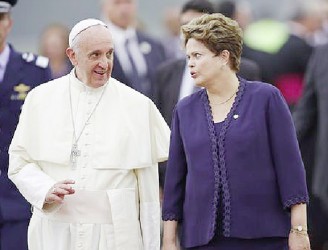RIO DE JANEIRO (Reuters) – Pope Francis arrived in Brazil yesterday on his first foreign trip as pontiff and was swarmed by well-wishers as he drove into Rio de Janeiro, where more than one million people are expected to gather to see the first Latin American to head the Roman Catholic Church.

Welcomed by a committee of local dignitaries, including President Dilma Rousseff, a smiling Francis waved to onlookers before proceeding by motorcade to Rio’s city centre at the start of a week-long gathering of young faithful in Brazil, home to the world’s largest Catholic population.
Thousands of local Catholics, visiting pilgrims and curious Brazilians lined avenues to greet Francis, who rode at first in a closed car with his window open. The crush of well-wishers led to a lapse in security when crowds swarmed the car as it entered central Rio.
People surrounded the vehicle, a small silver Fiat, to take photos and touch the pontiff through his open window. Bodyguards moved in to push back the crowd, which at one point was so heavy that the car was forced to a halt.
The pope’s visit to the Atlantic coastal metropolis is part of the biennial World Youth Day gathering. “God wished that the first international trip of my pontificate should take me back to my beloved Latin America,” said Francis, an Argentine, in a speech shortly after arriving.
Despite the novelty of a new pope, the visit comes as secular interests, other faiths and distaste for the sexual and financial scandals that have roiled the Vatican in recent years caused many Catholics in Latin America and around the world to leave the Church.
The trip also comes amid growing economic and social dissatisfaction in Brazil, home to more than 120 million Catholics. The unease in June led to the biggest mass protests in the country in two decades, as more than 1 million people in hundreds of cities rallied against everything from rising prices to corruption to poor public services.
In his speech, Francis alluded to the recent protests.
“I ask everyone to show consideration towards each other and, if possible, the sympathy needed to establish friendly dialogue,” he said.
In the five months since he succeeded Benedict, Francis has pleased many with his simple style, rejection of luxuries and calls for the Church to advocate on behalf of the poor and social justice. Aboard his plane early yesterday, the pope told reporters the world risks losing a generation of young people to unemployment and called for a more inclusive culture.
“The world crisis is not treating young people well,” Francis, 76, said. “We are running the risk of having a generation that does not work. From work comes a person’s dignity.”
Brazilian officials hope that his message of solidarity with the poor and working classes will minimize the possibility of major protests during his visit.
Still, they have deployed more than 20,000 soldiers, police and security officials. While some of the measures are routine security provided for any visiting head of state, they are compounded by the popular draw of the pope, especially because Francis decided to travel around the city in an open-top vehicle at times and occasionally mix with the throngs.
Yesterday, police in Sao Paulo, a neighbouring state where Francis will visit a Catholic shrine, said they safely detonated a small, homemade explosive they found in a nearby parking garage. It was unclear if the device, made with a plastic pipe wrapped in tape, was related to the pope’s visit.
Small, scattered street protests unfolded in Rio yesterday evening and further demonstrations are planned during the visit, mostly by feminists, gay rights groups and others who disagree with the Church’s long-standing social doctrines. Brazil’s recent protests, organised through social media by a disparate group of online activists, make other demonstrations likely, even if on a much smaller scale than in June.
So far, an adulatory atmosphere reigned.





